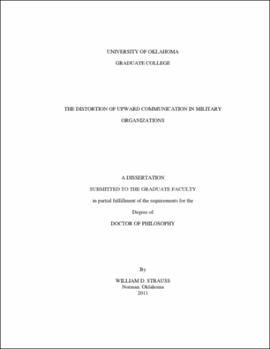| dc.description.abstract | This study explores the relationship between subordinates' inclination to distort negative upward organizational communication and four personality variables. The study used a postulated Upward Organizational Communication Distortion Index to measure the propensity of the study participants to distort upward organizational communication, then tested four personality variables--(1) Quality of Superior-subordinate Relationship using Leader-Member Exchange Theory, (2) Locus of Control, (3) Need for Cognition, and (4) Tolerance of Ambiguity--measured during the same survey session, to ascertain whether any correlated with the theoretical propensity to distort negative upward organizational communication. The study population was Department of the Army senior civilian employees assumed to be pursuing careers as civilian employees within the Department of the Army. Although no conclusive evidence was found that linked any of the four independent variables, weak correlations between some of the independent variables and two of the dependent variable subscales were established that suggest further investigation. | |
